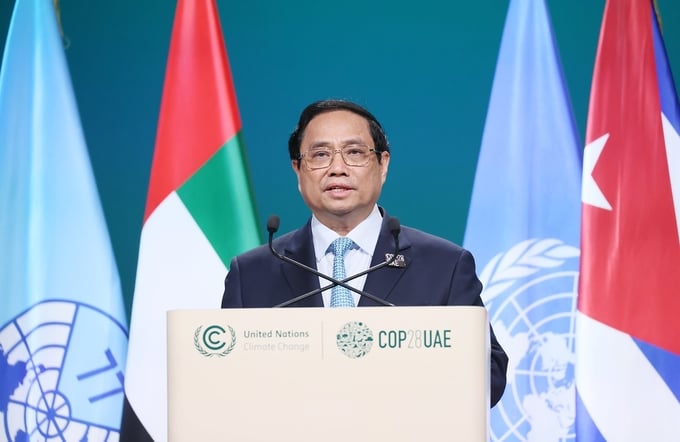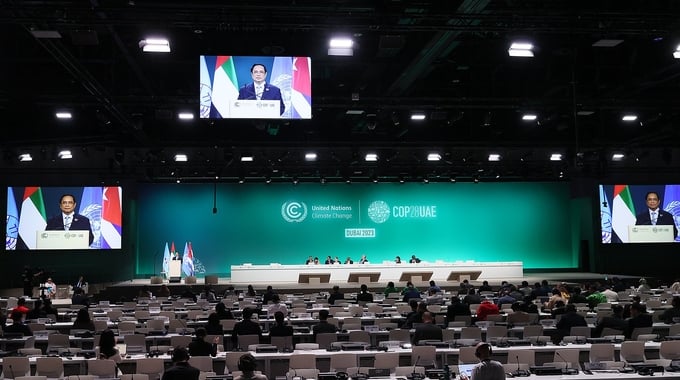June 21, 2025 | 01:16 GMT +7
June 21, 2025 | 01:16 GMT +7
Hotline: 0913.378.918
June 21, 2025 | 01:16 GMT +7
Hotline: 0913.378.918

Prime Minister Pham Minh Chinh presenting during the discussion session of the summit. Photo: VGP.
The summit, chaired by the President of Cuba and 2023 Chairman of the G77 - Miguel Diaz-Canel Bermudez, saw the participation of the Secretary-General of the United Nations - Mr. Antonio Guterres, as well as senior leaders and representatives from 134 member states of the G77 and numerous international organizations.
At the summit, President Miguel Diaz-Canel Bermudez of Cuba underscored the significance of strengthening unity and international cooperation in addressing global challenges. He called on member states of the Group of 77 to continue fostering cooperation, voicing their concerns, and protecting the rights and interests of developing countries directly and severely affected by climate change.
The Secretary-General of the United Nations emphasized the importance of developing countries in promoting multilateralism towards climate goals. Furthermore, he emphasized the importance of climate justice and urged developed countries to increase their support for South-South cooperation in meeting financial commitments for climate action.
The conference welcomed and highly regarded the pivotal significance of the successful adoption of the Loss and Damage Fund agreement. It affirmed the need to leverage the role of the Group of 77, enhance actions, and promote effective solutions to address the impacts of climate change.
During the main discussion session of the summiy, Prime Minister Pham Minh Chinh delivered a significant speech conveying Vietnam's stance and commitments to addressing climate change. He also outlined several cooperation directions for the G77 in the near future.
The Prime Minister applauded Cuba's initiative in organizing the conference, affirming Cuba's leadership role as the Chair of the G77.

Prime Minister Pham Minh Chinh proposed three cooperation directions within the G77 summi to address climate change. Photo: VGP.
With an emphasis on the importance of effective adaptation to climate change on both a global and national scale, the Prime Minister proposed three cooperation directions within the G77.
Firstly, promoting a global, inclusive approach and emphasizing a shared but differentiated responsibility, ensuring fairness, reasonableness, and consideration for the economic and social development needs of developing countries.
Secondly, prioritizing collaboration in science, technology, and innovation within the G77, with a focus on establishing an inclusive cooperation mechanism, thereby effectively utilizing the strengths of both developed countries (in terms of capital and technology) and developing countries (in terms of markets and resources).
Thirdly, promoting climate finance in a more accessible direction without increasing debt burden or trading off resources to achieve other development goals.
The Prime Minister also emphasized Vietnam's strong commitment to green transformation dring COP26, participation in JETP, and the implementation of plans, projects, and strategies for green growth, sustainable development, and energy transition. He expressed the country's willingness to cooperate and share experiences with G77 member states.
The G77 Summit on Climate Change attracted the participation of numerous leaders from countries and international organizations, demonstrating the growing global interest in South-South cooperation mechanisms.
The gathering of G77 member states to share perspectives and a common voice on climate change is crucial in the context of escalating global challenges and the increasing vulnerability of developing countries. It also contributes to fostering unity and international cooperation for global climate goals.
Translated by Nguyen Hai Long
![Turning wind and rain into action: [9] Digitizing hydrometeorological data in response to climate change](https://t.ex-cdn.com/nongnghiepmoitruong.vn/608w/files/news/2025/06/17/z6704423696987_15fd32ffc26d590d204d520c9dac6786-nongnghiep-165943.jpg)
(VAN) Farmers have begun accessing hydrometeorological applications to adjust their cropping schedules, aiming to ensure productivity and adapt to climate change.
![Turning wind and rain into action: [8] Real-time salinity detection and early warning technology](https://t.ex-cdn.com/nongnghiepmoitruong.vn/608w/files/news/2025/06/17/z6704423696987_15fd32ffc26d590d204d520c9dac6786-nongnghiep-151127.jpg)
(VAN) Thanks to the integration of modern hydrological-hydraulic models, remote sensing technologies, and artificial intelligence, the accuracy of hydrological forecasting has significantly improved.
![Turning wind and rain into action: [7] Early disaster warnings help marine farmers minimize losses](https://t.ex-cdn.com/nongnghiepmoitruong.vn/608w/files/news/2025/06/17/z6704423696987_15fd32ffc26d590d204d520c9dac6786-nongnghiep-142942.jpg)
(VAN) In recent years, thanks to early disaster warnings and forecasting, marine farmers in Khanh Hoa province have been able to reduce risks and losses, thereby improving production efficiency.
![Turning wind and rain into action: [6] ‘Four on-the-spot’ disaster management software](https://t.ex-cdn.com/nongnghiepmoitruong.vn/608w/files/news/2025/06/17/e5a48259d6a262fc3bb3-nongnghiep-183800.jpg)
(VAN) By simply activating the scenario on the disaster management software, the relevant authorities immediately know how many households need to be evacuated, where to evacuate them to, and by what means of transportation…
![Turning wind and rain into action: [5] Hue applies modern technology in disaster forecasting](https://t.ex-cdn.com/nongnghiepmoitruong.vn/608w/files/news/2025/06/17/z6704423696987_15fd32ffc26d590d204d520c9dac6786-nongnghiep-093938.jpg)
(VAN) In Hue city, modern technology has recently been applied in meteorological and hydrological forecasting and warning, helping to reduce the damage caused by natural disasters.

(VAN) A cutting-edge farming technique being implemented on an experimental ranch in Arizona's Sonoran Desert has already saved a billion gallons of water over five years, according to Civil Eats.

(VAN) Poultry and pig production and the environment can be boosted through enhanced water technology, according to new research.